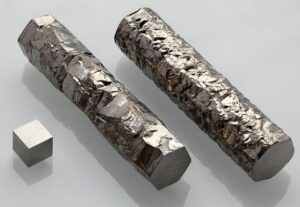Technology of metallothermic production of hafnium

Hafnium is a metal that can change the world for the better.
Hafnium has high density, strength, corrosion resistance and the ability to absorb neutrons. That is why it is widely used in the nuclear industry and aerospace.
Hafnium is also used in the production of alloys for the manufacture of turbine blades of aircraft engines, in particular, in the aviation and rocket and space industries. Due to its properties, hafnium plays an important role in technological progress and improving safety in various industries.
Hafnium can provide high speed, low power consumption, large capacity and reliability of data storage. It can also contribute to the development of new areas such as quantum computing, artificial intelligence, neuromorphic engineering and others.
A breakthrough in hafnium research opens the door to the creation of ultra-fast, efficient and inexpensive computer memory.
APPLICATION
- Nuclear industry
- Rocketry
- Aircraft engineering
- Shipbuilding
- Electronics
- Artificial intelligence
- Fiber optics Infrared optics
- Chemical industry
- Oil and gas industry
PRODUCTION
Hafnium always accompanies zirconium in its minerals. Therefore, it is economically feasible to extract hafnium from zirconium sponge production waste.
JSC “Titanium Institute” has developed a modern highly efficient technology for producing sponge zirconium from zirconium dioxide by chlorination and magnesium-thermal reduction of the resulting zirconium tetrachloride, which can be used to produce sponge hafnium.
The basic process flow chart for magnesium-thermal production of sponge hafnium includes the following process operations:
– salt chlorination of hafnium dioxide;
– purification of the resulting hafnium tetrachloride;
– vacuum separation of the hafnium-containing reaction mass;
– preparation of the reducing magnesium;
– processing of sponge hafnium blocks into commercial products.

Get a free consultation and presentation of our technologies!
Fill out the form and our experts will contact you to discuss the details, answer your questions, and offer the best solutions for your business. In the “Message text” field, briefly write what you are interested in.